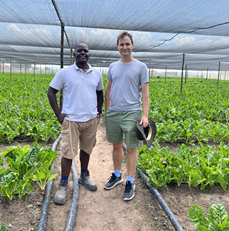 "Small farmers are one of the most underutilized resources in Africa," says Tendai Chitapi, co-founder of Kuronga, "because no-one has put their hand up to coordinate and manage them. That's the feedback we always get from potential buyers: small farmers are too fragmented, they say, and their volumes and quality are not consistent, so it's difficult to rely on them. We're solving this challenge by creating a coordination platform through which we manage quality and volume."
"Small farmers are one of the most underutilized resources in Africa," says Tendai Chitapi, co-founder of Kuronga, "because no-one has put their hand up to coordinate and manage them. That's the feedback we always get from potential buyers: small farmers are too fragmented, they say, and their volumes and quality are not consistent, so it's difficult to rely on them. We're solving this challenge by creating a coordination platform through which we manage quality and volume."
Right: Tendai Chitapi and Oliver Windram of Kuronga
Winner of the most creative use of 4IR award last year in the inaugural Milken-Motsepe Agritech Award, Kuronga is an AI-driven platform that connects small-scale farmers to the market. Chitapi notes that traditionally small farmers face a high rejection rate because of quality mismatch, but, he remarks, there is actually a buyer for every grade.
Food waste is often the outcome when produce is rejected; Kuronga aims to significantly reduce food waste by intelligently targeting different grades of crop to the appropriate market.
Immediate crop feedback 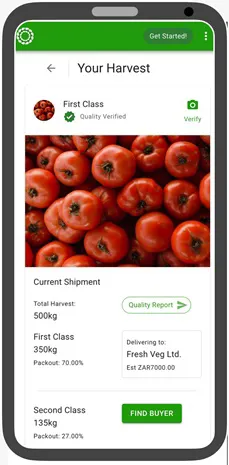 Kuronga offers a 'Freemium' service model: farmers can freely upload photos of produce to get an initial grading assessment and immediate exposure to buyers on the Kuronga platform.
Kuronga offers a 'Freemium' service model: farmers can freely upload photos of produce to get an initial grading assessment and immediate exposure to buyers on the Kuronga platform.
Kuronga also sells the Kuronga Quality Ruler, a visual assessment tool that displays the 24 colours of the International Colour Code palette and a scale bar. "Combined with higher tier paid subscription offerings that utilize artificial intelligence to determine quality, this tool allows Kuronga and buyers on the platform to accurately interpret the true colour of the produce and its size. Colour and size are two key criteria used to determine vegetable grades," he explains.
"Overall, these grading tools help to improve communication between buyers and farmers on the vital importance of quality, its standardization and its impact on the price paid for produce. The artificial intelligence grading systems built with this data from millions of small-scale farmers creates robust, generalizable grading systems. These systems can further be utilized in large commercial packhouses."
The paid subscription options on the platform are tiered: R300/month providing daily market information related to seasonal price movements to feed into crop planning, automated grading, and intelligent market targeting for graded produce. For R1,000 per month baseline agronomic advice is also provided. Kuronga's top tier subscription (at a monthly R2,000) offers a seasonal growing programme that includes soil testing, crop guidance, production planning, crop budgeting and forecasting. Participating farmers are also connected to selected input suppliers (seedlings, chemicals, fertilisers, microbiology analysis) at discounted rates.
The Kuronga platform is currently operating in South Africa in the Johannesburg area with a community of farmers and buyers, independent aggregators and wholesalers who list their requirements.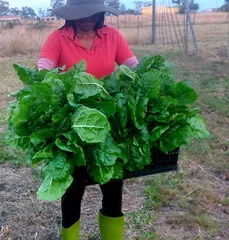 "The immediate feedback that followed the photos I uploaded of my sweet peppers was really valuable," says Noxolo Maseko (right) who runs Mother Nature's Farm with her mother in Wallmansthal. "It's a great feature on the app: buyers, even if they're not taking your produce, help you with your grading and give you advice. Like with my peppers: they noticed I wasn't grading it properly and mixing the sizes."
"The immediate feedback that followed the photos I uploaded of my sweet peppers was really valuable," says Noxolo Maseko (right) who runs Mother Nature's Farm with her mother in Wallmansthal. "It's a great feature on the app: buyers, even if they're not taking your produce, help you with your grading and give you advice. Like with my peppers: they noticed I wasn't grading it properly and mixing the sizes."
AI for agricultural extension in Africa
"As we've been engaging with small farmers, we've realised they need more holistic support," observes Chitapi. Their first cohort of seasonal farmers are currently establishing their winter crops according to the Kuronga winter production schedule.
Maseko, who initially used the Kuronga app to get advice on the wholesale market's fluctuations, responded to Kuronga's call for farmers to participate in this full programme. "I had tried everything within my means and I still wasn't profitable with my sweet peppers, because I couldn't time it properly. At the time when I was harvesting, most of the big producers were already sending in their supply. And then my stock would be on the backburner at the market."
Kuronga tailored a crop production programme for her, according to which she has just planted red and green cabbage seedlings. "Initially I was not so taken with the red cabbages, but Tendai told me it takes a smaller space and with potentially twice the income."
On Kuronga's advice, she bought SAKATA variety seedlings from Hishtil. "It's the first time I've ever had such strong seedlings. There's been no transplant shock whatsoever, especially with the red cabbage seedlings."

She notes that sharing the production guide with her staff has helped with their buy-in. "The Kuronga production guide is so comprehensive, it leaves little to the imagination regarding watering or fertilization."
She farms without electricity and fills up her water tank from a communal borehole at night so as not to inconvenience other water users. Being part of the Kuronga community has helped her focus on growing her crop rather than getting bogged down in all details surrounding crop selection and growing guidance.
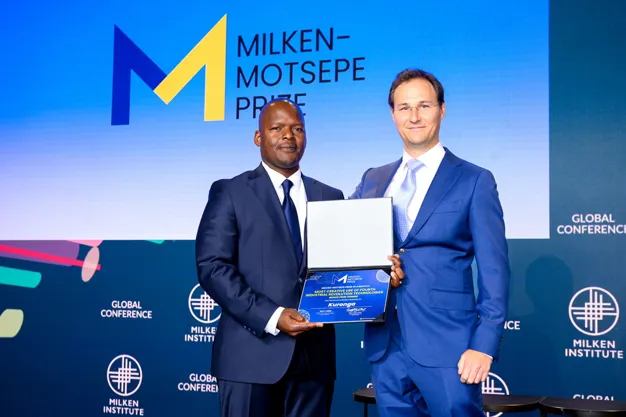 Tendai Chitapi and Oliver Windram receiving the Milken-Motsepe Agritech Award in Los Angeles, 2023.
Tendai Chitapi and Oliver Windram receiving the Milken-Motsepe Agritech Award in Los Angeles, 2023.
African agritech potential virtually untapped
"The agritech space in Africa is grossly underfunded," Chitapi states, "and the potential is virtually untapped. You cannot talk about supporting innovation in agriculture without talking about how you invest in solutions like ours. Startups in the agri space need support to scale up. Our vision is pan-African because the challenges of market access exist across the continent."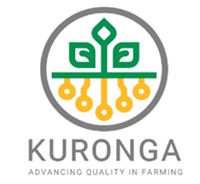
For more information:
Tendai Chitapi
Kuronga
Tel: +27 72 235 3118
Email: [email protected]
https://kuronga.com/
